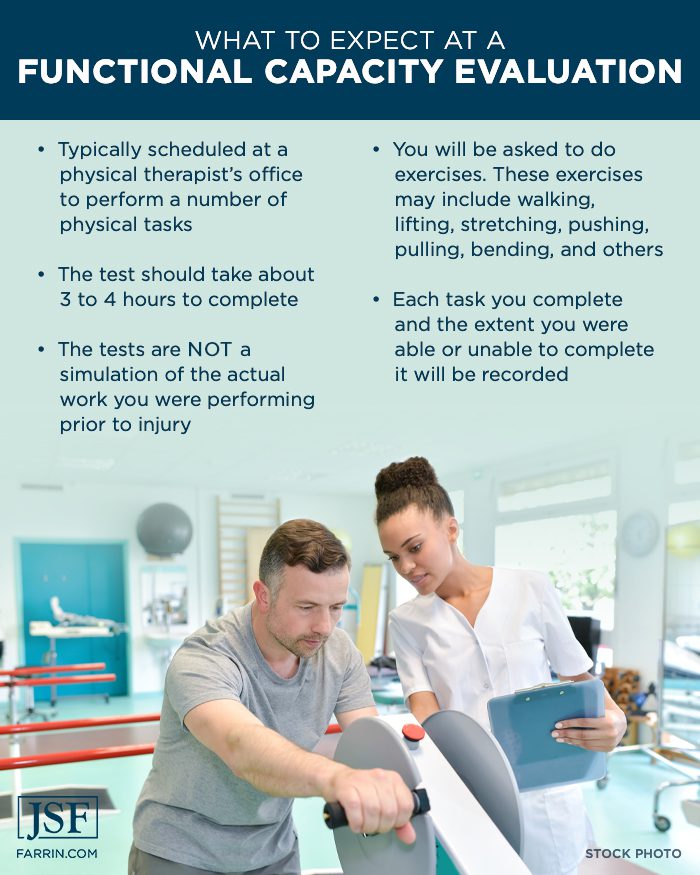Is your workers’ compensation doctor recommending a Functional Capacity Evaluation, often referred to as an FCE? If so, I’m sure you have lots of questions. While an FCE can be a useful tool to explore your physical limitations after a work-related injury, there are certain things you need to know before moving forward.
What Is an FCE?
I like to think of an FCE as a physical therapy session on steroids.
FCEs are typically scheduled at a physical therapist’s office, where you will be asked to perform a number of physical tasks over a designated period of time. You should expect to spend approximately three to four hours completing the testing. While all evaluators conduct their FCEs differently, you will likely be asked to walk, lift, stretch, push, pull, bend, and possibly do other exercises. The evaluator will record each task you complete and the extent to which you are able (or unable) to complete it.
However, an FCE is not a simulation of the actual work you were performing when you were injured. For that reason, the results of an FCE may not provide a definitive answer as to whether or not you are able to return to your pre-injury job. In a workers’ compensation context, the FCE report is typically forwarded to, and interpreted by, your authorized treating physician.
Why Does My Doctor Want Me to Complete an FCE?
FCEs are commonly used to determine return‐to‐work readiness and quantify your functional limitations after a work-related injury. Most doctors are not trained to make comprehensive determinations regarding your physical abilities. Therefore, they require a little outside help. That’s where the FCE comes in.
However, sometimes it may not be in your best interest for a doctor to rely too heavily on an FCE to determine which jobs you are physically capable of performing. FCEs are often treated as the best way to determine your work abilities; in my experience, that’s probably not the case.
As noted above, the data from your FCE must be interpreted by your treating physician and applied to real world jobs. Unfortunately, they often don’t take into account the day-to-day rigors of your actual occupation. For that reason, it’s very important for you to educate your doctor about the essential functions and physical demands of your job before they make a determination about your readiness to return to work.
What Do I Need to Know Before I Perform My FCE?
Most FCE facilities believe they are able to determine when someone is exaggerating their symptoms or failing to give 100% effort during testing. In my opinion, the “science” behind these methods is shaky at best. Even so, the evaluator’s findings will often make it into the FCE report, which is likely to be seen by your doctor. For this reason, it’s important for you to talk to the FCE evaluator prior to testing about their expectations of you. You should plan to at least attempt any task you believe you are physically capable of performing and give the maximum amount of safe effort.
FCEs are just one piece of the puzzle when it comes to your overall physical limitations and ability to return to the workforce. You should always discuss the results with your doctor and be sure to address any issues you encountered during testing.
Enlist the Help of Experienced Workers’ Comp Professionals
If you have additional questions about FCEs, contact an experienced workers’ compensation lawyer at the Law Offices of James Scott Farrin.
If you are asked to get an FCE, I urge you to get legal advice by contacting us or calling 1-866-900-7078. If we are able to take your case, we will try to ensure that you are well prepared for your FCE, and we will fight to protect your workers’ compensation rights.
You May Also Be Interested In
What Is a Functional Capacity Evaluation?
What to Do If Denied a Second Opinion for Workers’ Comp





